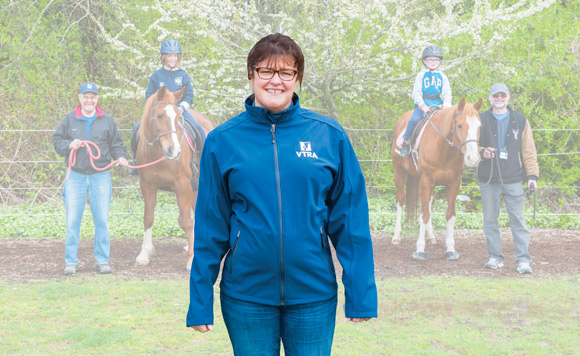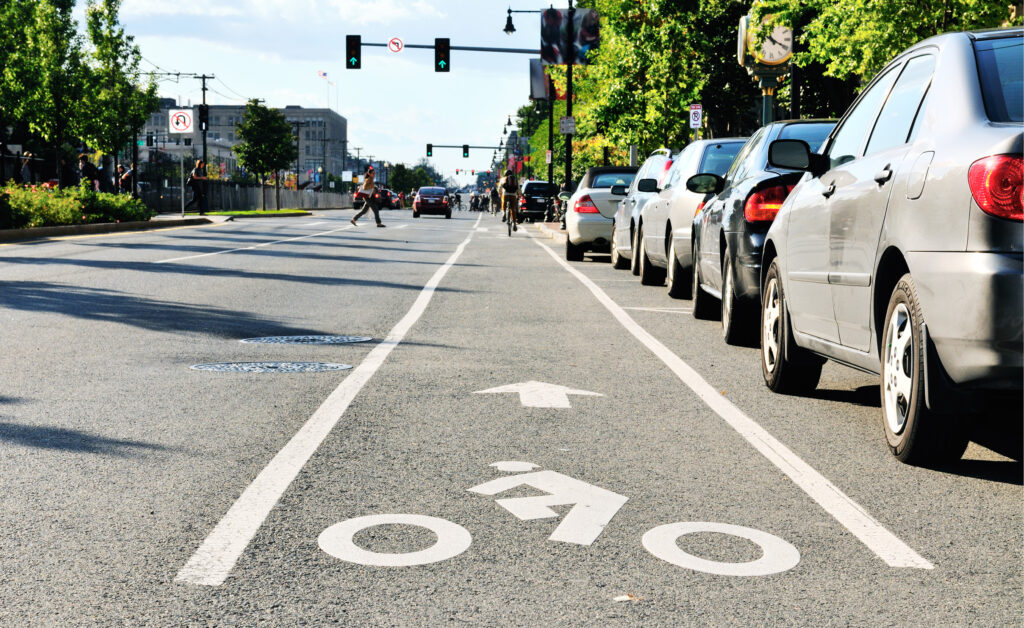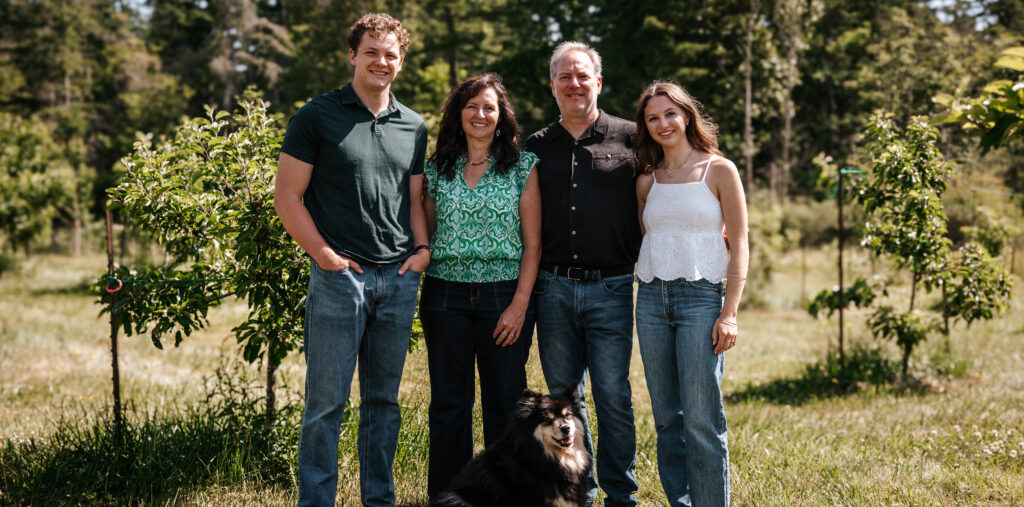EDITORIAL DIRECTOR DEBORAH ROGERS CHATS with AUDREY COOPER,
EXECUTIVE DIRECTOR OF THE VICTORIA THERAPEUTIC RIDING ASSOCIATION
You joined the Victoria Therapeutic Riding Association (VTRA) staff as Operations Manager after having volunteered for the organisation for many years, and then became Executive Director in 2015. What led you into this very specific line of work? Have you always had a connection with horses?
I grew up in France, just outside of Paris, and discovered horses at age seven when my parents registered me for riding lessons at a riding school close to our home. I immediately fell in love with the sport and the animals. I moved to the U.K. for my studies, and had to pause my equestrian activities for a while. I arrived in Victoria in 2002 and I reconnected with my passion when I leased a horse at a local barn. After the birth of my second son in 2008, on the recommendation of a friend who also happens to be a long-time volunteer with the VTRA, I enlisted as a volunteer. Witnessing the impact the VTRA programs had on our participants, their families and loved ones had a major effect on me. When the opportunity to work for this organisation arose in my field of study, I immediately applied. And the rest, as they say, is history!
Psychologists have several suggestions as to why humans derive such pleasure from having animals in their lives. Many domestic animals have been bred to showcase physical attributes that we find appealing, such as large eyes and floppy ears, and as such we tend to respond to them as we would an infant. There is also the validation we get from caring for pets and their dependence on us. There are records of domestic horses from as early as 4000 BC; their usefulness as transport and labour is obvious, but why else do you think humans connect so deeply with horses?
I believe the connection between horses and people goes much deeper than the physical attributes. Horses are extremely skilled in perceiving emotions. As prey animals, they are always extremely aware of and reactive to the energy in their immediate environment. Horses are known to mirror emotions you approach them with, whether soft and patient or stressed and scared. It is often said that horses will feel your anxiety and react to it. In fact, we could think of it as your horse perceiving stress or fear, but with no capacity to understand the origin of this stress or fear, his natural reaction will be to assume the presence of a predator that we should all be scared about, including his rider.
Another source for deep connection between humans and horses is the amazing talent these gentle giants have for establishing communication channels with people. Their body language is particularly expressive: for example, a warning will be expressed with ears pinned and turning their body away; ears forward and head up signify their attention to the environment. The interactions between the rider and his or her mount are also discreet but effective. Slight movements of the hand or pressure of the calves is enough to communicate what you want to your horse.
The VTRA enriches the lives of children and adults with disabilities through the provision of therapeutic horseback riding programs. Horses have been utilized as a therapeutic aid since ancient Greece; why are they so uniquely equipped to provide therapeutic help to those with disabilities?
Horses are uniquely equipped to offer people multiple opportunities for therapy.
Our mission is to provide a therapeutic horseback riding program for children and adults with disabilities that promotes and enriches their physical, psychological and social well-being. The therapeutic value created from the use of horses cannot be reproduced by traditional types of therapy and include:
Physical – the motion of riding a horse uniquely parallels human walking. Each stride strengthens the rider’s muscles. This results in improved balance, coordination, muscle strength/agility and providing physical exercise;
Psychological – horseback riding frees participants from assistive devices, including wheelchair or walkers, and provides a sense of independence. Controlling a large animal has positive effects on self-esteem, self-image and confidence;
Social – the scope of social experience for some people with special needs is quite limited, in many cases restricted to family members and a small group of medical specialists. As a result, many are further impeded by a lack of communication and interpersonal skills. Through contact with their horse, instructor and volunteers, the rider’s social world expands and then interpersonal skills improve.
How many horses do you have on “staff” and where do the association’s horses come from? Do they require specialised training?
The VTRA herd is made up of 12 horses. All of them have been hand picked by our professional staff for their specific qualities. Considerations when choosing a horse for a therapeutic program include size (height and width as sitting astride a wide horse can be a challenge for some of our riders), gait (fast or slow; smooth or choppy), and most importantly their temperament. It is essential that our horses are as even tempered as possible to avoid problems in case of a rider’s unpredictable behaviour.
Our 12 horses come from very different backgrounds. We have bought some of them, received some as gifts, and others still are free-leased by our organisation. Once they arrive in our program, our instructors devise specialised training programs adapted to the needs of each particular horse, so that they are able to fulfill their jobs in our program for the benefits of their riders.
VTRA offers classes to more than 160 children and adults with disabilities that include cerebral palsy, down syndrome, autism, intellectual challenges, hearing or vision impairment, and many more. What does a typical day at VTRA look like?
There really is no such thing as a typical day at the Victoria Therapeutic Riding Association! Each week, our 12 horses are in classes with 80 different individuals requiring the help of around 170 volunteers. That is many opportunities for things to not go as planned!
We run between five and seven classes daily from Monday to Thursday. Classes include adaptive riding, where our participants ride horses in a group lesson of four riders, and stable management, where participants learn more about horses and how to care for them. On Friday mornings, we have classes for our littlest riders, between the ages of three and five, who come for our Early Intervention Program developed in partnership with the Queen Alexandra Centre for Children’s Health.
Located close to Keating Crossroad, your facility was provided by a benefactor. Tell me about the set up and what the facilities mean to those the Association aims to support.
The VTRA was created by a group of very dedicated volunteers in 1989. With no facility and only a couple of lent horses available, we started small. Over the next 20 years, the VTRA programs moved from facility to facility, relying on the generosity of various local barn owners to let us operate out of their facility. In 2009, we moved to our current facility, located in Saanichton, thanks to the generosity of our benefactor Anne Waterhouse. Anne has made her property available to the exclusive use of our programs. Thanks to her, we have access to stalls and paddocks for our horses, an indoor ring which guarantees the running of classes independently of the weather, an outdoor ring and a club house with a viewing area for parents and caregivers. We even have a classroom attached to the barn for our stable management students! Thanks to Anne, our students are guaranteed to be able to participate in their chosen programs in optimal conditions and our horses are professionally looked after.
Maintaining the facility and horses must be expensive – does all your funding come through donations or is there government support for these therapy programs?
Victoria Therapeutic Riding Association is committed to continuing to provide an affordable therapeutic option for individuals with disabilities.
VTRA is a fee for service organization. We receive no government funding and rely entirely on grants, fundraising and program fees. Staff and volunteers work tirelessly to raise money for the program, through a variety of fundraisers, events, and grant applications.
Photo by www.nuttycake.com.




